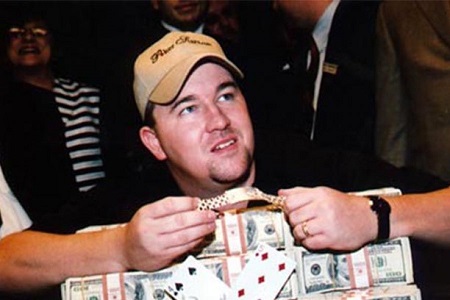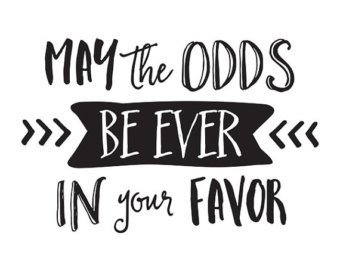The lessons playing poker thought me - part 1
The history of poker
The game of poker has been around for a long time. It's been played for ages and it has seen various variations across it's history. Nowadays though, the most commonly played variant of poker is "Texas hold'em" where you get dealt 2 cards and can use 5 community cards to improve your hand strength with. In poker, luck, bluff and skill get combined to make the most profits from your opponents. Most people agree with the luck and bluff part, but don't know about the amount of skill that's involved in the way people play poker these days. More about that later.
Around fifteen years ago poker got a lot of mainstream attention. TV-shows like "Poker after dark" and "High Stakes Poker" attracted a big audience and got a lot of views. On top of that, the world of poker enjoyed what's called the "Moneymaker"-effect in 2003. The moneymaker effect isn't about a scheme to quickly make money, but it refers to Chris Moneymaker, who won the main event of the WSOP (World series of Online Poker). This tournament is held once a year in Las vegas, and people can play online satelite-events to try and win a spot in the tournament. If you can't qualify online, you can also buy-in for a mere $10k. So in 2003, Chris Moneymaker, an amateur poker-enthousiast from the USA, qualified for the biggest tournament in Poker for only 39 dollars. He flew to Las Vegas and managed to win the WSOP Main Event to take home a whopping 2.5 millions dollars. This story got such a big media-attention that the online pokerworld experienced an influx in players like we would never see again. Poker was booming, and people started to find ways to beat the game and get as much money from the "newbies" as possible.
From a game of luck to a game of skill
People started to study the mathematics behind poker. Poker become a game of calculating your odds and probabilities to win the hand. The best players in the world mentioned they studied for about 8 hours a day and played for about 4-6 hours a day. The pro's played up to 24 tables at a time to try and maximize their winnings. After each session played, they would put their interesting hands into a calculator and they tried to figure out the best way of playing their cards. The game of poker has changed drastically in the past 10 years, and nowadays it's close to impossible to be a winning player without learning the fundamentals of how poker is played, knowing the strength of your hand in comparison to the possible holdings of your opponent etc.
So what did I learn from my time playing poker?
First of all I saw how hard it was to become "good" at poker, let alone be a winning player, let alone being a huge winning player. The people at the top of the game had to study the game for hours and hours, day after day month after month. It was eye-opening for me to see how difficult it was and how obsessed one had to be with the game to be successful at it. You literally have to think, breath and sleep poker if you want to make it. Just like in top-sport, sacrifices had to be made to make it big, and without that passion you wouldn't get anywhere.
The second big thing for me was accepting that, even if you played a hand perfectly and there was nothing more to be done, poker still has a portion of luck involved you can't control. Let's say you play good poker and you put yourself in a position where you have 60% chance to win the hand. Your skill improved your chances by 10%, which is nice, but 40% of the time you will still lose the hand. You can make the best decisions possible, but sometimes it's not enough. When I started playing poker that frustrated me to no ends. If I got all the money in AA vs KK and I would lose, I got frustrated and would shout this game was unfair to me, this shouldn't happen etc. Even worse; after such an event I would get tilted and play the next 100 hands without thinking and chasing my losses, which resulted in even bigger losses. But the reality is: AA vs KK doesn't have 100% chance of winning, it only has around 80% chance. So 1 in 5 times I will lose the hand. That's a hard lesson to learn, but after a while I became less frustrated by "bad beats" and could forget about them and play on.
This way of thinking is something that poker forces you to embrace, because otherwise you'll constantly get frustrated and chase after losses. It's a way of thinking we can convert into everyday-situations aswell though. Sometimes doing our best isn't enough, and that's something we can't control. Instead of getting frustrated by that, we have to move on and give it another shot. Life isn't one nice, linear graph upwards. We have our ups and downs, and the only thing we have control over is to give ourselves the best odds possible to find new all time highs.
Thanks for reading, see you next time!


Always pleasure to read well-written content about poker even though I haven't played in a while (maybe I'll try someday again at Steem Poker League). The main lesson I got from my poker days is the ability to handle risk and emotions, especially negative one's because they happen "way too often" in poker.
I think you summed up these thoughts right on point.
Also, I think some of the poker skills nicely translate into the crazy volatile world of crypto where markets are largely driven by emotions at the moment.
True stuff. I think I first got into cyrpto because of Doug Polk by the way, so there's that :D. Thanks for reading ! :)
Oh yeah, it was pleasant surprise when I discover Doug Polk doing crypto videos after I had forgotten him since my poker days. The quy got back into my favorite Youtubers ;)
This post has received a 2.78% upvote from @aksdwi thanks to: @tuwore.
If you really want to know how much luck is involved in poker check: http://pokerdope.com/poker-variance-calculator/
For example, you play 1 million hands with 3bb/100 winrate and 150 standard deviation. There is a over 2% change of losing during that period. So that's 30 000bb below ev.
This site has lots of other useful and interesting information about variance. Like how likely it is that you have a downswing of 10000 hands during that same period of 1million hands etc (it's 52%).
Nice to read about poker.. I love the game, played a lot online.. and won some nice tournaments .. but since I left Holland for Spain I could net enter the poker application anymorem. and here in Hungary it gives me the notification that I am not allowed to play here.. I checked it about a week ago, as I wanted to play again after a while. Never knew that the big players had to study their hands so hard to keep winning..